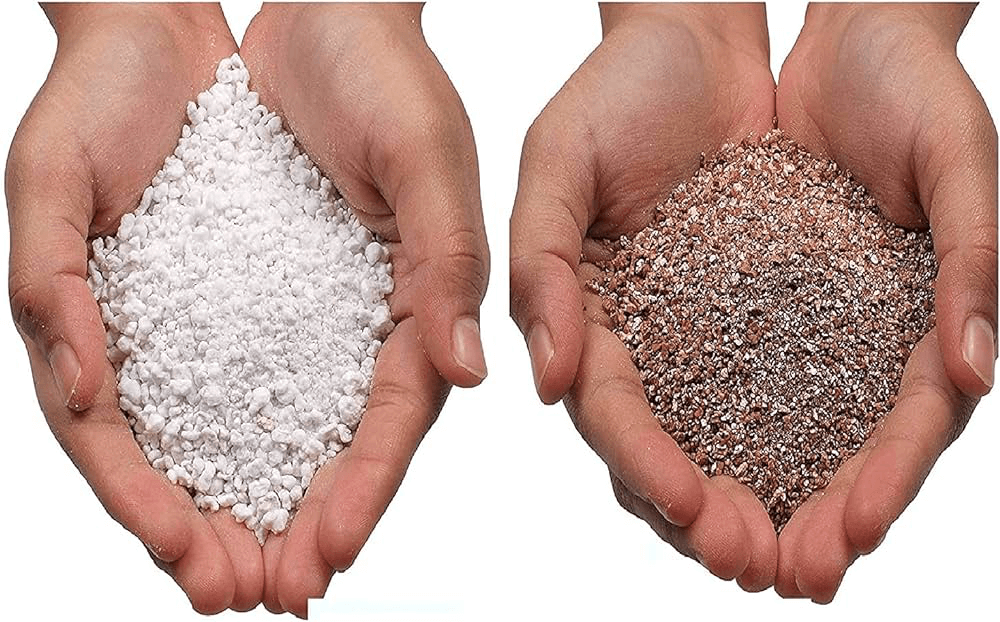If you’ve ever looked closely at your potting soil, you may have seen a white or off-white granular material mixed in. This is most noticeable when using compost to sow seeds, take cuttings, or repot a home plant. These materials are vermiculite and perlite.
These two useful compounds are a blessing for all gardeners. They can improve compost drainage while also retaining moisture, which appears to be a contradiction. So, first and foremost, what is vermiculite? What exactly is perlite? What exactly do they do? What’s the distinction? Which one should you pick?
Here in this informative blog by top experts at Amol Mine Chem, we’ll delve into everything you need to know about Perlite vs Vermiculite.
What is perlite?
The hydration of obsidian produces perlite, also known as “volcanic popcorn,” which is an amorphous volcanic glass. By heating volcanic glass until it swells and “pops,” it turns into a white, granular substance. It’s sterile, lightweight, and has a neutral pH, making it a breeze to deal with.
Perlite for Plants
When mixed with compost, it traps air pockets, improving drainage. Perlite is frequently employed in the propagation of cuttings, when free-draining compost is required, or in the sowing of seeds. Perlite soil absorbs water and can be used to promote moisture retention in compost since it is porous, but its major application is to improve drainage.
Perlite is most commonly mixed with compost to increase drainage when planting. Here are some of the most prevalent applications: A perlite-to-compost ratio of 1:4 creates a free-draining potting medium perfect for succulents.
Perlite will root softwood and semi-ripe cuttings. Fill a plastic bag halfway with wet perlite, then insert the cuttings and seal the bag. After a few weeks, roots will begin to form. Once the roots have formed, the cuttings can be potted. To avoid inhaling dust from perlite, dampen it with water before using it.
Also Read: All about perlite for plants
What is Vermiculite?
Vermiculite is created by expanding a naturally occurring mineral (magnesium aluminum iron silicate). It is a naturally occurring mineral, similar to perlite.
Horticultural vermiculite is a type of planting material that resembles little golden-brown flakes. It can absorb up to four times its own weight in water and some minerals required by plants, including potassium, magnesium, and calcium.
Vermiculite for Plants
Vermiculite, because of its water retention, is the best choice for potting up plants that require moist compost. It is sold in two grades: medium and fine. The medium grade is preferable for cutting compost, while the fine grade is excellent for seed sowing.
How to Plant using Vermiculite
Vermiculite is most commonly used to increase moisture retention. Here are a couple such examples: A 50/50 mix of compost and vermiculite is ideal for water-loving houseplants like maidenhair fern. 30% medium-grade vermiculite mixed with compost creates an ideal substrate for cuttings and seedling potting.
To prevent “damping off,” which happens when a fungus attacks seedlings and causes them to collapse, sprinkle a thin layer of vermiculite on the compost after you have spread the seeds.
Difference Between Perlite and Vermiculite
Perlite and vermiculite are nearly identical. However, there are some significant variances. Vermiculite is superior for water retention, which means it maintains critical nutrients for your plants and cuttings to absorb.
Perlite is more effective at assisting drainage, which means it is also more effective at loosening heavy, compacted soil. Perlite will be your best buddy during the winter months if you have clay soil.
Conclusion
Perlite and vermiculite, both suitable for integrating into potting mixes, are authorized for organic gardening, and neither disintegrate in soil, so once added, you will reap the benefits indefinitely. Vermiculite and perlite are only two of the numerous beneficial goods available at our facility. Purchase Vermiculite Seed Sowing Compost right now from Amol Minechem. Visit us today for all of your gardening requirements!
